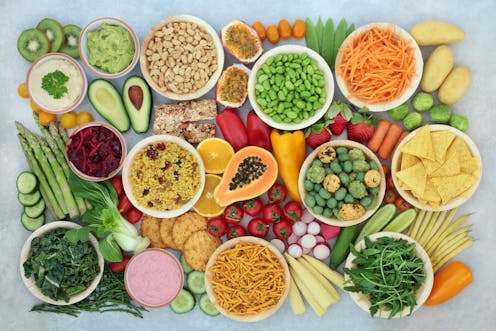Vegan, vegetarian and flexitarian diets could save you money – new research
We found that vegan and vegetarian diets cost a third less than current high-meat, high-dairy diets many people follow.


Many people are choosing to make the switch to plant-based diets for many reasons – including as a way of cutting their climate footprint or to be healthier.
Yet there’s long been the notion that plant-based diets are inherently more expensive than following a more traditional omnivore diet – which is why some people may be hesitant to make the switch. But it turns out that this isn’t entirely accurate. In fact, the recent research my colleagues and I published in Lancet Planetary Health found that eating a healthier and more sustainable diet (such as vegan, vegetarian, pescatarian or flexitarian) could actually slash up to a third off your food bill if you live in a high income country – like the UK, the US or Europe.
To conduct our study, we used data from the World Bank, which regularly collects information on the prices of many different items to estimate the purchasing power of different countries as a way of calculating their gross domestic product (GDP). For food items, they collected data on over 460 products from markets around the world. These items ranged from global products – such as widely available rice brands – to regional products unique only to certain countries.
We used the price data on both global and regional items to calculate the average cost of different food groups – including rice, fruits and vegetables, legumes and fish – by country. To calculate the total cost of diets and cost changes, we then paired the price data with information on current food demand and waste from the Food and Agriculture Organization of the United Nations and with recommendations for dietary patterns that can be healthier and more sustainable than current diets – such as flexitarian, pescatarian, vegetarian and vegan. This told us how much a person might spend on average to follow different diets.
Affordability
The results of our analysis came as a bit of a surprise. If you look solely at the costs of the ingredients, a vegan diet actually costs a third less than the current “western” diets with high amounts of meat and dairy that many people consume in high income countries like the UK. Vegetarian diets clock in at a similar value, while people following flexitarian diets saved on average 14%. Only pescatarian diets – which include a higher proportion of fish and seafood – can sometimes cost 2% more than current diets.
To put it into perspective, we estimate that the typical western diet costs about US$50 per week per person (£37). In comparison, flexitarian diets cost are around $42 per person per week, vegetarian diets as low as $34, and vegan diets as low as $33. That means, over the course of a year, you could save almost $900 per person by switching to a more plant-based diet.

The important thing to keep in mind here is that the data we used refers to the costs of basic ingredients – such as fruits, vegetables, legumes and so on. We didn’t include ready-made meals, take-aways, or highly processed foods such as plant-based burgers. That means, if you want to realise these savings, go for minimally processed foods and try out some new recipes. That’s not only better for your wallet, but will in most cases also healthier and more sustainable than diets based on highly processed foods.
Things were a bit more complicated, however, when looking at low income countries, such as sub-Saharan Africa. There, typical diets consist mainly of starchy foods. We found that although following vegan, vegetarian, flexitarian or pescatarian diets were a quarter cheaper than following a western diet high in meat and dairy, these dietary patterns were still at least a third more expensive to follow than the high-starch diets that are currently consumed in low income countries.
Affording to follow a healthy and sustainable diet in low income countries is clearly a challenge. This is why our study also looked at how we could bring costs down. We found that when economic development in poor regions was paired with efforts to reduce food waste and introduce health and climate-friendly food pricing, it was possible to make sustainable diets cost-competitive in low income countries within a decade.
Transitioning towards healthier and more sustainable diets is urgently needed to prevent dangerous levels of climate change, and to tackle the health burden of poor diets. Our study shows that, given the right political support, healthy and sustainable diets can also be affordable, not only in high-income countries but everywhere.![]()
Marco Springmann received funding from Wellcome and the he Global Panel on Agriculture and Food Systems for Nutrition during the conduct of this study.
What's Your Reaction?






























































































